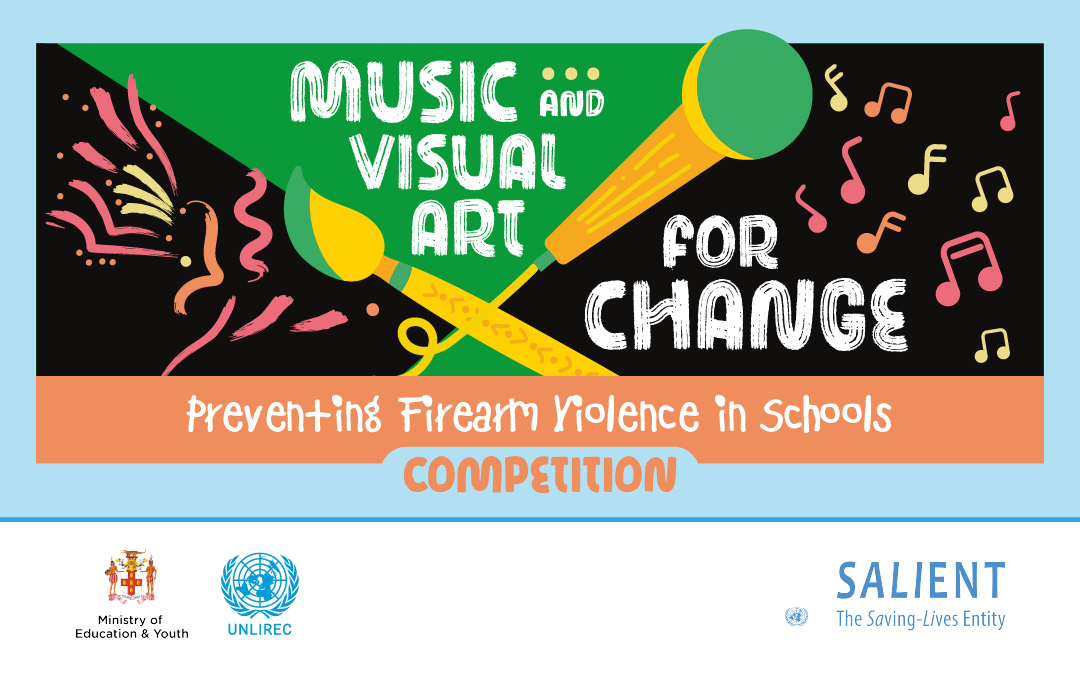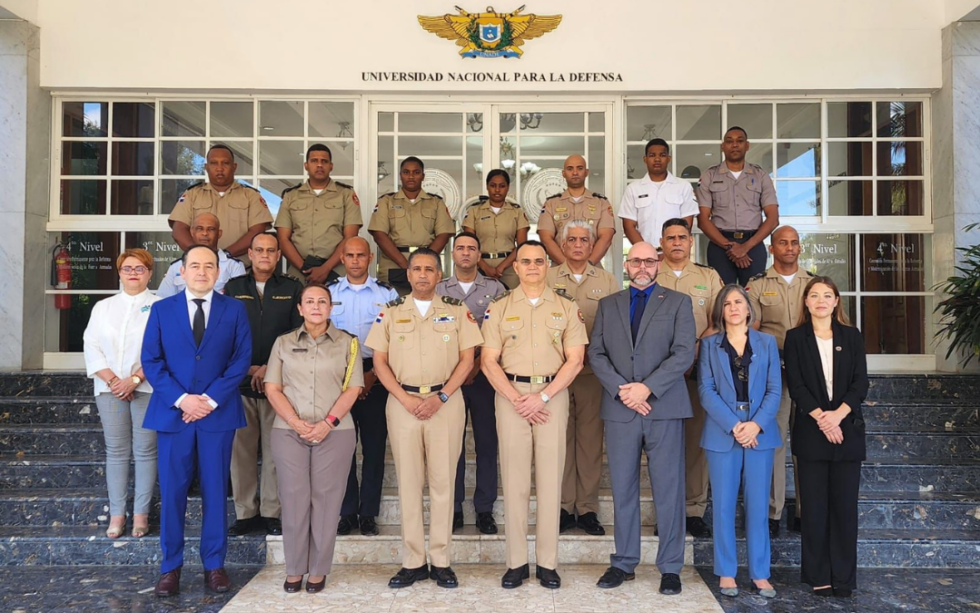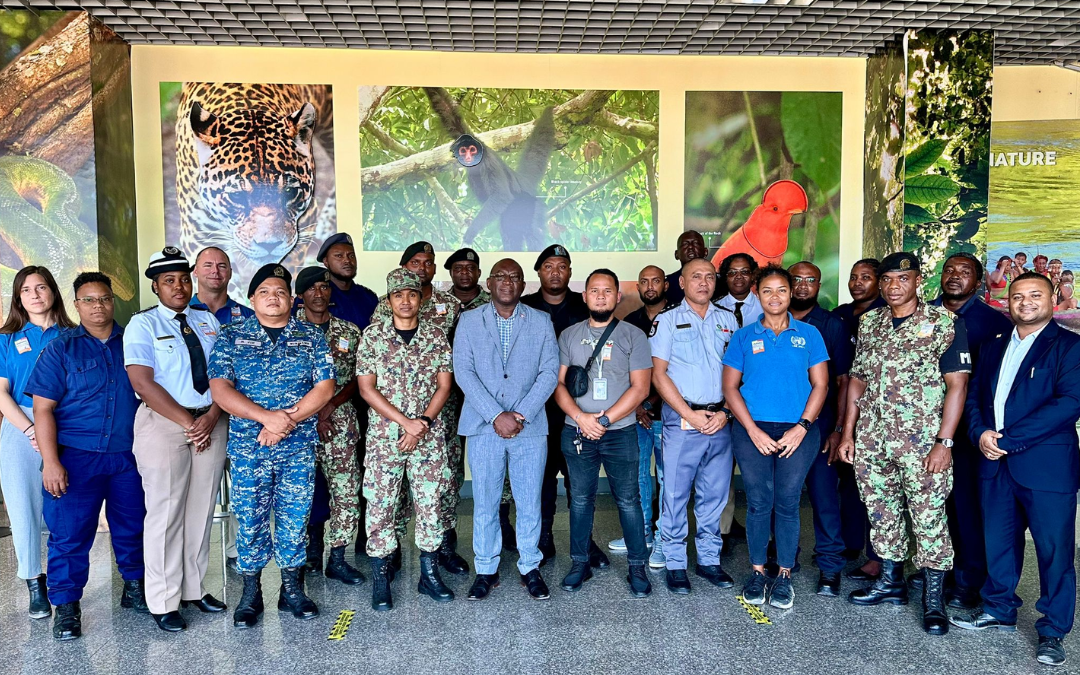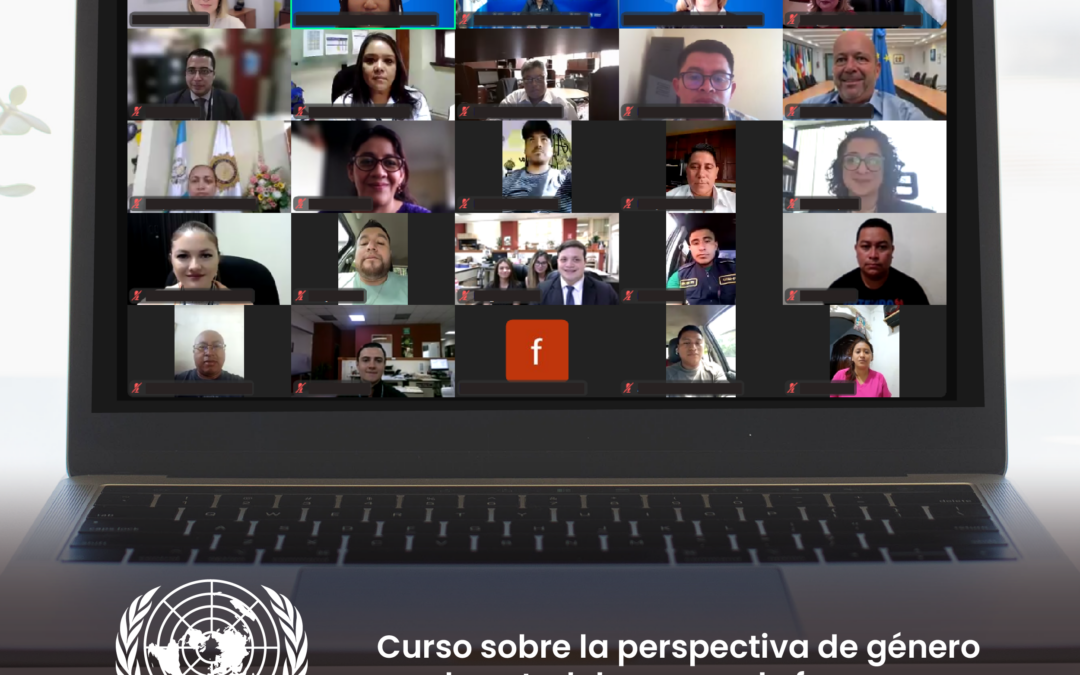
Sep 18, 2024 | Conventional Arms Programme
Kingston/Jamaica, 18 September 2024 – In an effort to take a stand against firearm violence in Jamaican schools, the United Nations Regional Centre for Peace, Disarmament, and Development in Latin America and the Caribbean (UNLIREC) and the Jamaican Ministry of Education and Youth (MOEY) have launched a competition entitled “Music and Visual Art for Change: Preventing Firearm Violence in Schools”. This initiative invites students ages 12 to 19 across Jamaica to use their artistic and musical talents to convey the powerful message of peace and firearm violence prevention.
The “Music and Visual Art for Change” competition seeks to harness the transformative power of music and art to address and prevent firearms possession and violence in schools. By encouraging Jamaican youth to create art and music that promote peace, this initiative aspires to shape a positive narrative that stands against the normalization of firearm violence.
The competition seeks to emphasize that firearms are not symbols of power or strength. True strength is found in standing firm in one’s values, prompting peace, unity, and positive change, including through creative self-expression. Respect is earned through kindness and establishing non-violent conflict resolution in communities, while cultivating positive influences. By embracing these principles, the initiative aims to support and inspire the younger generation to reject violence and build safe, non-violent, inclusive and effective learning environments for all.
How to Participate
Jamaican students, ages 12 to 19, can submit their artistic creations, including paintings, drawings, graphic designs, photographs or musical compositions at www.unlirec.org/music-art by 21 October 2024. Entries should reflect the core message of non-violence and peace, promoting the prevention of the possession of firearms and their use in schools.
The competition opens today, 18 September 2024, and will run until 21 October 2024. Entries will be reviewed between 21 October 2024 and 10 November 2024, and the public will have the chance to vote for their favorite submissions via social media. Finalists will be announced on 11 November 2024. The competition will culminate with an event held in Kingston, Jamaica, during the month of November, which will showcase the submissions of the finalists and will be followed by an award ceremony to announce the winners of the competition.
To learn more visit www.unlirec.org/music-art and follow UNLIREC´s and MOEY´s social media accounts for updates and announcements: @unlirec_official, @moeyjamaica, @unjamaica.
Help us spread the word about this important initiative by sharing this opportunity with your friends, family, and colleagues! Together, we can create a safer future, free from firearm violence, in Jamaica.
“Music and Visual Art for Change: Preventing Firearms Violence in Schools” is part of the activities carried out by the United Nations and Jamaican authorities under the Saving Lives Entity (SALIENT) fund initiative in Jamaica. This initiative seeks to tackle armed violence in Jamaica as part of a comprehensive approach to sustainable security and development.
This competition supports the implementation of the Youth, Peace, Security agenda; the United Nations General Assembly resolutions on Youth, disarmament and non-proliferation, as well as; the 2030 Agenda for Sustainable Development.
The United Nations Regional Centre for Peace, Disarmament and Development in Latin America and the Caribbean (UNLIREC) plays a vital role in advancing arms control, fostering peace, and supporting sustainable development across the region.
The Jamaican Ministry of Education and Youth (MOEY) is committed to improving educational outcomes and the well-being of students across Jamaica.
For more information, please visit www.unlirec.org/music-art or email music-art@unlirec.org.

Sep 12, 2024 | Conventional Arms Programme
From 10 to 13 September 2024, the United Nations Regional Centre for Peace, Disarmament and Development in Latin America and the Caribbean (UNLIREC), in collaboration with the Dominican Republic Ministry of Defence, carried out a firearms laser marking workshop in Santo Domingo, Dominican Republic.
UNLIREC, thanks to the generous support of the State Department of the United States, has donated a laser marking machine to Dominican Republic Ministry of Defence, with the aim to enhance the national capacities and efficiency in the marking of firearms. An adequate marking, in line with international standards, is essential for an adequate control of firearms in circulation in the country and more effectively countering illicit trafficking.
Ten officers from Dominican Republic Armed Forces, including (…), participated in this workshop, which allowed them to build their knowledge about the international guidelines for marking firearms and their practical skills to mark firearms using the laser marking machine donated by UNLIREC.
The four-days workshop featured a number of lectures on topics such as the international guidelines for marking firearms as a control measure, methods of marking firearms, technical recommendations for Latin American and Caribbean states to mark firearms, Dominican Republic legal framework and policy on marking firearms, and the techniques to restore and trace serial numbers on firearms. Participants also benefited from hands-on practical exercises to mark firearms with the laser marking machine.
This initiative aligned with Goal 4 of the Caribbean Firearms Roadmap, which seeks to systematically reduce the risk of diversion of firearms and ammunition from government and non-government-owned arsenals.
The workshop was conducted within the framework of UNLIREC’s project “Preventing Diversion of Conventional Arms and Ammunition in the Caribbean”, funded by the U.S. Office of Weapons Removal and Abatement in the State Department’s Bureau of Political-Military Affairs.

Sep 11, 2024 | Conventional Arms Programme
From 9-18 September, prosecutors from Honduras are participating in the Specialized Course for Prosecutors on the investigation of Firearms-related Crimes from a Gender Perspective (CEFAF). This course is organized by the United Nations Regional Center for Peace, Disarmament and Development in Latin America and the Caribbean (UNLIREC), in coordination with the “Orlan Arturo Chávez” Training School of the Honduran Prosecutor’s Office.
This course is conducted in a virtual format and aims to raise awareness among public prosecutors and support staff about the importance of incorporating the gender perspective into the design of legal strategies and the development of case theories in investigations of crimes against women involving the presence of firearms.
“The organization of this course was motivated by a deeply concerning issue: femicide, particularly the use of firearms in the commission of this grave crime. The extremely high rate of impunity for these offences is unacceptable. We must improve in this area. As prosecutors, t is in your hands to conduct thorough investigations that lead to arrests and subsequent convictions in the courts”, emphasized the representative of the UN Resident Coordinator’s Office in Honduras.
The Course for Prosecutors on the Investigation of Firearms-related Cases from a Gender Perspective (CEFAF) encourages exchange and participation. It aims to understand the experiences, good practices, and challenges faced by the Honduran Prosecutor’s Office in applying a gender perspective during investigations.
The CEFAF is aligned with the 2030 Agenda for Sustainable Development, particularly Goals 5 and 16. These goals aim to eliminate all forms of violence against all women and girls and to reduce illicit arms flows.
This activity is part of the SALIENT (Saving Lives Entity) in Honduras, implemented by UNLIREC (as the UN Office for Disarmament Affairs’ regional center) and the United Nations Development Program (UNDP).

Sep 4, 2024 | Conventional Arms Programme
From 4 to 25 September 2024, authorities from Surinameparticipated in a specialized training course on Interdicting Small Arms, Ammunition, Parts and Components (ISAAPC), organized by the United Nations Regional Centre for Peace, Disarmament and Development in Latin America and the Caribbean (UNLIREC).
Twenty-one officials, including five women, from various agencies — such as the Ministry of Defence, the Suriname Armed Forces, the Korps Militaire Politie, Airport Authorities and the Suriname Police Force— actively engaged in this hybrid course: This marks the first national ISAAPC training delivered in Suriname, aimed at enhancing the country’s capacity to detect trafficked weapons and ammunition.
The ISAAPC course combined virtual theoretical sessions with in-person practical presentations and exercises. Participants received hands-on training using an X-ray simulation programme, an interactive platform designed to teach users to identify concealment methods employed by traffickers in the region. This platform was developed by the Centre for Adaptive Security Research and Applications (CASRA).
Through this training, participants learned essential fundamental aspects of X-ray technology for detecting and identifying small arms, their parts and components, ammunition, and explosives placed or concealed in postal shipments, packages, parcels, and luggage at entry, exit, and transit points across the country.
The ISAAPC course UNLIREC’s technical assistance under the ’‘Combating Illicit firearms and Ammunition Trafficking in the Caribbean” project, funded by the United States. It aligns with the 2001 UN Programme of Action on small arms, the Arms Trade Treaty, and the 2030 Agenda for Sustainable Development, particularly target 16.4. This initiative also supports regional efforts to prevent illicit trafficking of firearms and ammunition, as outlined in the Caribbean Firearms Roadmap.

Aug 29, 2024 | Conventional Arms Programme
On 23 July, 25 July, and 14 August 2024, the United Nations Regional Centre for Peace, Disarmament and Development in Latin America and the Caribbean (UNLIREC), in collaboration with the Caribbean Community Implementation Agency for Crime and Security (CARICOM IMPACS) delivered a series of webinars centred on the monitoring and evaluation (M&E) component of the Caribbean Firearms Roadmap (CFRM).
The three webinars were conducted as part of a broader initiative to support States in their monitoring and evaluation efforts, titled “Roadmap to Reporting: A Sensitization and Training Series for Monitoring and Evaluation under the Caribbean Firearms Roadmap” ahead of the reporting deadline of 25 September 2024.
The webinars addressed three key topics, beginning with an introduction to M&E for the CFRM, followed by the data collection for the CFRM, and the use of data to advance the CFRM.
Presentations were delivered by UNLIREC, CARICOM IMPACS, and the United Nations Development Programme, Southern Eastern and Eastern Europe Clearinghouse for the Control of Small Arms and Light Weapons (UNDP SEESAC). Additionally, States were invited to share their experiences with the M&E processes of the Caribbean Firearms Roadmap during these sessions.
A total of fifty-nine persons participated in at least one of the webinars, including twenty-two women, representing nine States: Bahamas, Barbados, Belize, Dominican Republic, Haiti, Guyana, Jamaica, Saint Lucia, and Trinidad and Tobago.
The series of webinars was carried out in line with Goal 1 of the Caribbean Firearms Roadmap, in particular, Action 1.3.3, as well as Sustainable Development Goal 16, “Peace, justice, and strong institutions” (Target 16.4), and were made possible with funding from Canada.
UNLIREC, as the regional centre for the United Nations Office for Disarmament Affairs seeks to advance the cause of practical disarmament in Latin America and the Caribbean. This effort is part of its commitment to support Member States in implementing international disarmament and non-proliferation instruments, in particular the 2001 United Nations Programme of Action on Small Arms (UN PoA).

Aug 2, 2024 | Conventional Arms Programme
From 22 to24 July and 1 to2 August 2024, the United Nations Regional Centre for Peace, Disarmament and Development in Latin America and the Caribbean (UNLIREC), in coordination with the Ministry of Foreign Affairs and the Ministry of the Interior of Guatemala, conducted the virtual edition of the Course on Gender Perspective in Arms Control (GENCAF).
Approximately 30 officials from government institutions that comprise the National Violence Prevention Commission –participated, including the Ministry of the Interior, the Ministry of Foreign Affairs, the Technical Secretariat of the National Security Council, the National Police, the Strategic State Intelligence Secretariat;, the Ministry of Health and Social Assistance, and the Presidential Secretariat for Women (SEPREM).
The fact that most gun owners are men, along with the high levels of violence are associated with young men – both as perpetrators and victims – are not issues disconnected from gender roles. This is also true for the excessive and unregulated presence of firearms and the alarming rates of violence against women. According to data from ECLAC’s Gender Equality Observatory (consulted in October 2023), an average of twelve femicides were committed daily in the Latin American and Caribbean region during 2021.
In response to this problem, UNLIREC addresses key concepts related to gender and firearms through the GENCAF course. The course presents s the different global policy frameworks and emphasizes the importance of disaggregated statistical data as a crucial first step in diagnosing armed violence from a gender and intersectional perspective. Additionally, the course aims to promote inter-institutional cooperation among the participating national sectors.
The GENCAF course includes live sessions that allow participants to engage and share their experiences and reflections, as well as self-managed virtual sessions available on the Disarmament Education Dashboard.
It is worth noting that, to foster reflection on the context in Guatemala, the course included presentations national institutions, such as the Statistics Section of the National Police, the Ministry of the Interior and the civil society organization IEPADES (Instituto de Enseñanza para el Desarrollo Sostenible).
The Course on Gender Perspective in Arms Control (GENCAF) is part of the technical assistance provided by UNLIREC under the project Supporting the United Nations Programme of Action to Prevent, Combat and Eradicate the Illicit Trade in Small Arms and Light Weapons in All Its Aspects, which is funded by the European Union.






